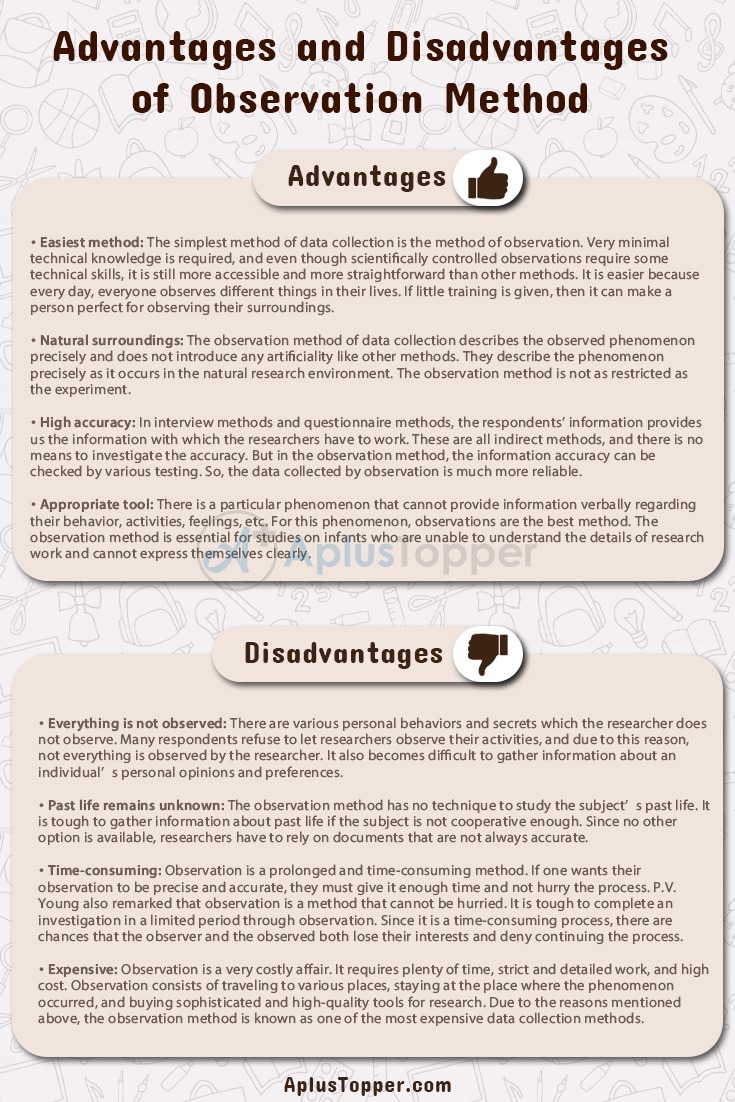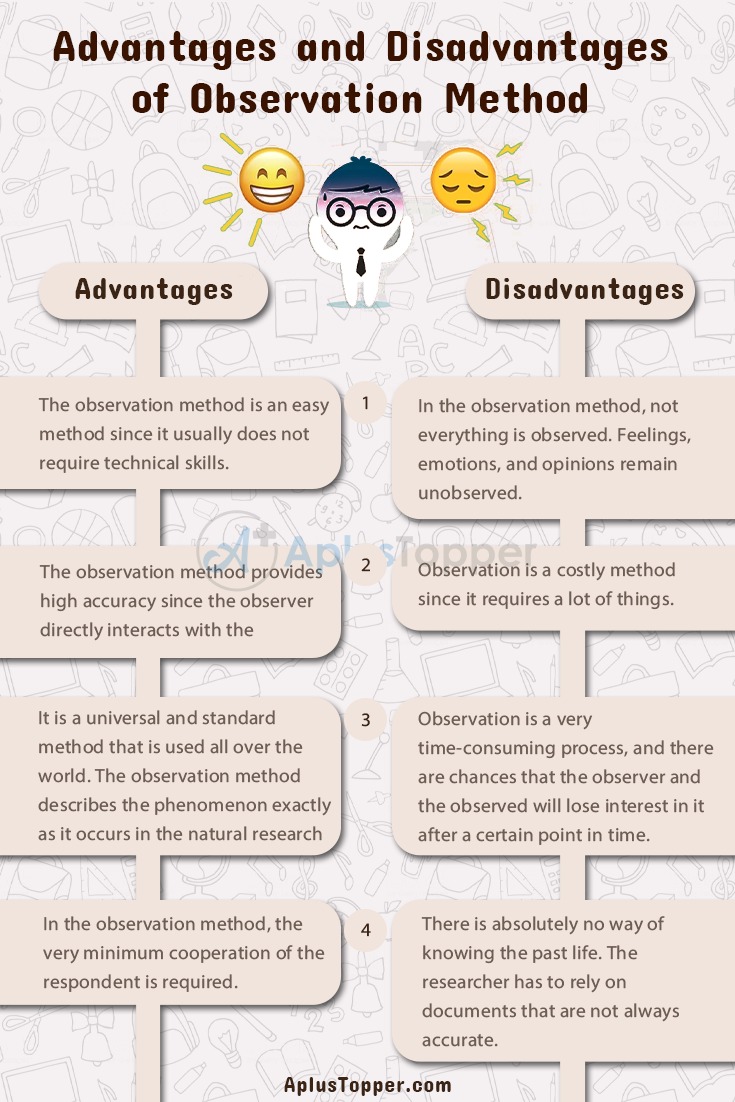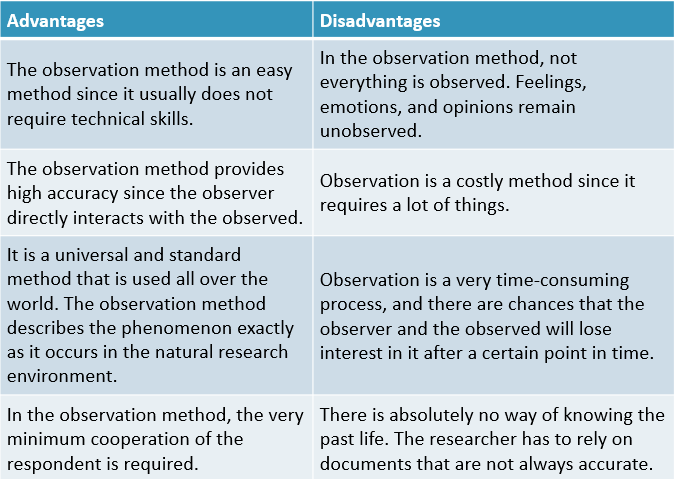Advantages and Disadvantages of Observation Method: For collecting information regarding various things surrounding us, the most common method is to observe and study the things around us. The various processes related to things should also be studied and observed. Hence, it is safe to say that observation acts as the primary fundamental method to collect information just about anything. Sometimes, when researchers use observation, they use it scientifically for various research works, but it should be kept in mind that only some observations are scientific and not all.
Students can also find more Advantages and Disadvantages articles on events, persons, sports, technology, and many more.
What is Observation Method? Advantages and Disadvantages of Observation Method 2021
The method of observation is qualitative. It is used to collect information by observing the subjects in a natural environment and then analyzing the information. Observation is based on behavioral patterns, psychological character, attitude and beliefs of the subject, etc.
The observation method consists of watching, listening, touching, and recording the behavior, attitude, and characteristics of objects or phenomena or living beings. By using this method, the researchers try to understand and comprehend the behavior and psychological character of the said subject.
- Advantages of Observation Method
- Disadvantages of Observation Method
- Comparison Table for Advantages and Disadvantages of Observation Method
- FAQs on Pros and Cons of Observation Method
Advantages of Observation Method
- Easiest method: The simplest method of data collection is the method of observation. Very minimal technical knowledge is required, and even though scientifically controlled observations require some technical skills, it is still more accessible and more straightforward than other methods. It is easier because every day, everyone observes different things in their lives. If little training is given, then it can make a person perfect for observing their surroundings.
- Natural surroundings: The observation method of data collection describes the observed phenomenon precisely and does not introduce any artificiality like other methods. They describe the phenomenon precisely as it occurs in the natural research environment. The observation method is not as restricted as the experiment.
- High accuracy: In interview methods and questionnaire methods, the respondents’ information provides us the information with which the researchers have to work. These are all indirect methods, and there is no means to investigate the accuracy. But in the observation method, the information accuracy can be checked by various testing. So, the data collected by observation is much more reliable.
- Appropriate tool: There is a particular phenomenon that cannot provide information verbally regarding their behavior, activities, feelings, etc. For this phenomenon, observations are the best method. The observation method is essential for studies on infants who are unable to understand the details of research work and cannot express themselves clearly.
- Less cooperation of the respondent is needed: The observation method does not require people’s willingness to provide information regarding them. There are various instances where the respondent refuses to speak about themselves and their personal life to an outsider. Some do not have the right communicative skills or time to provide information about themselves to researchers. Even though observation cannot always overcome such problems, it is still relatively easier to require less cooperation from the respondent.

Disadvantages of Observation Method
- Everything is not observed: There are various personal behaviors and secrets which the researcher does not observe. Many respondents refuse to let researchers observe their activities, and due to this reason, not everything is observed by the researcher. It also becomes difficult to gather information about an individual’s personal opinions and preferences.
- Past life remains unknown: The observation method has no technique to study the subject’s past life. It is tough to gather information about past life if the subject is not cooperative enough. Since no other option is available, researchers have to rely on documents that are not always accurate.
- Time-consuming: Observation is a prolonged and time-consuming method. If one wants their observation to be precise and accurate, they must give it enough time and not hurry the process. P.V. Young also remarked that observation is a method that cannot be hurried. It is tough to complete an investigation in a limited period through observation. Since it is a time-consuming process, there are chances that the observer and the observed both lose their interests and deny continuing the process.
- Expensive: Observation is a very costly affair. It requires plenty of time, strict and detailed work, and high cost. Observation consists of traveling to various places, staying at the place where the phenomenon occurred, and buying sophisticated and high-quality tools for research. Due to the reasons mentioned above, the observation method is known as one of the most expensive data collection methods.
- Personal Bias: The personal bias of the researchers affects their observation in many ways. This also creates issues for making valid generalizations. The observer or researcher may have their insight of right and wrong regarding specific events. They may also have different preconceptions related to a particular event which jeopardizes the objectivity of social research.
Advantages And Disadvantages Of Observation Method In Tabular Form
| Advantages | Disadvantages |
|---|---|
| 1. Naturalistic observation allows for a more accurate depiction of behavior. | 1. Observer bias may influence the accuracy of observations. |
| 2. Observations can be conducted in real-world settings, providing a more realistic understanding of behavior. | 2. Observer effect may occur, where the presence of the observer may alter the behavior being observed. |
| 3. Observation can be a non-invasive research method that does not require participants to self-report or reveal sensitive information. | 3. Observer reactivity may occur, where participants modify their behavior due to being observed. |
| 4. Observational data can provide rich and detailed information that cannot be obtained through other research methods. | 4. Observations can be time-consuming and may require multiple observers to ensure accuracy. |
| 5. Observation can be used to study a wide range of behaviors, including those that are difficult to measure through self-report or other methods. | 5. Observational data may be difficult to analyze and quantify, making it difficult to draw clear conclusions. |
| 6. Observational data can be used to validate or complement other research methods, providing a more comprehensive understanding of behavior. | 6. Observational research may raise ethical concerns if participants are unaware they are being observed. |

Comparison Table for Advantages and Disadvantages of Observation Method
| Advantages | Disadvantages |
| The observation method is an easy method since it usually does not require technical skills. | In the observation method, not everything is observed. Feelings, emotions, and opinions remain unobserved. |
| The observation method provides high accuracy since the observer directly interacts with the observed. | Observation is a costly method since it requires a lot of things. |
| It is a universal and standard method that is used all over the world. The observation method describes the phenomenon exactly as it occurs in the natural research environment. | Observation is a very time-consuming process, and there are chances that the observer and the observed will lose interest in it after a certain point in time. |
| In the observation method, the very minimum cooperation of the respondent is required. | There is absolutely no way of knowing the past life. The researcher has to rely on documents that are not always accurate. |

FAQ’s on Pros and Cons of Observation Method
Question 1.
In data collection, what is the importance of the observation method?
Answer:
In data collection, the observation method helps the researcher better understand the happenings in the environment and lends credibility to one’s explanation of the observation.
Question 2.
Why is the observation method ideal when you want to know about a particular physical environment for a phenomenon?
Answer:
In this case, the observation method is ideal because seeing the environment where a particular phenomenon occurs can help you increase your understanding of the phenomena you are evaluating.
Question 3.
What is observation in the research method?
Answer:
Observation in the research method is a qualitative research technique where the researcher observes the participant’s behavior in a natural environment.
